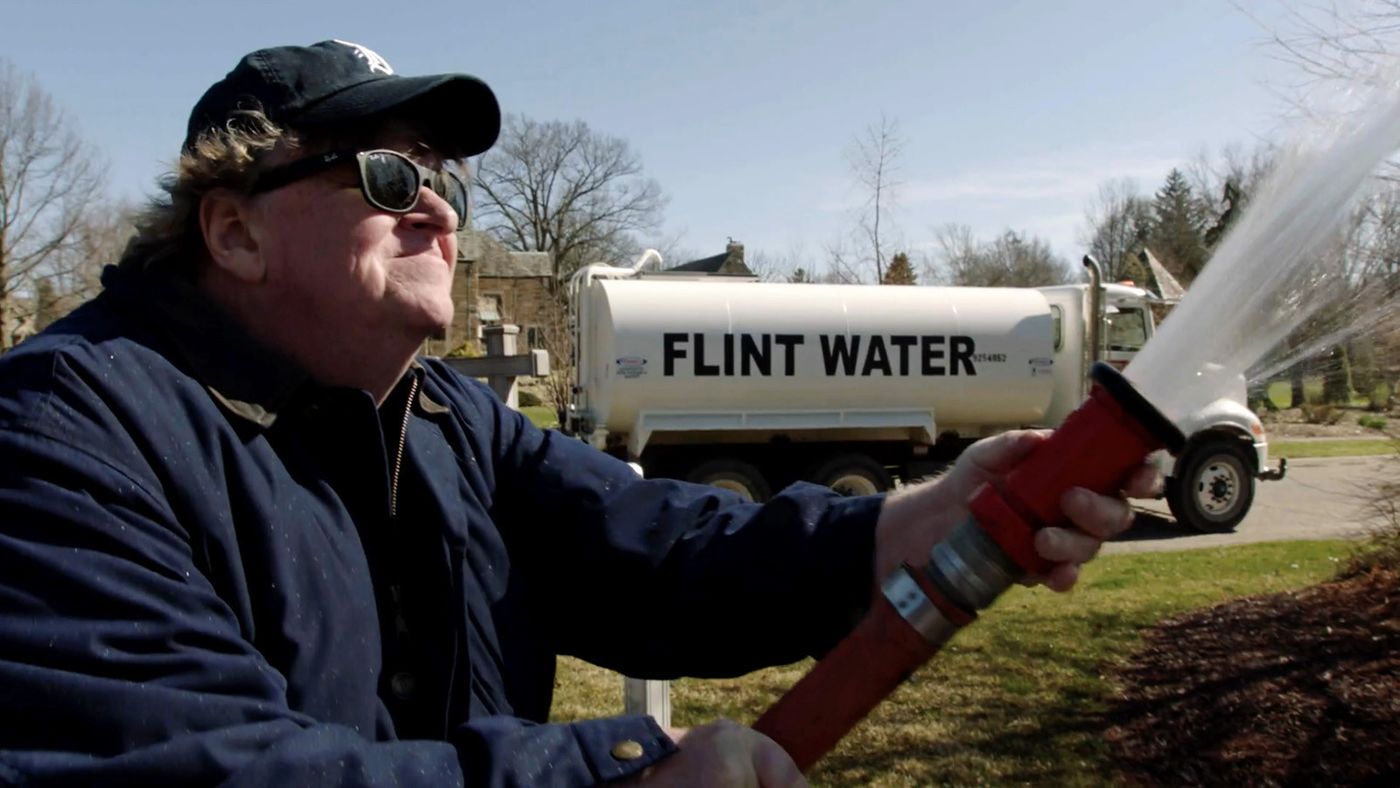From the posters, one might think that Michael Moore’s new documentary is all about skewering Donald Trump. Granted, the current president is a large target in “Fahrenheit 11/9”, a title that riffs on the Oscar winner’s “Fahrenheit 9/11.” (November 9, 2016 was the day that Trump won the presidency.) Moore casts a wider net here, ringing the warning bell about the damage being done by Trump and his minions, yes, but he also indicts the docile press and the lazy U.S. citizenry for idly watching it all happen. This film is a searing indictment of our nation’s politics and its electorate. He wants to shame us out of our complacency and show up and vote out those laying waste to the country.
Not too long ago, Moore could laugh about Trump. In 1998, they appeared together on Roseanne Barr’s syndicated talk show and he chuckled as ‘The Donald” praised his 1989 documentary “Roger & Me.” In that documentary, Moore famously took down the corrupt General Motors CEO Roger Smith. “I hope he never does one on me,” Trump worried on air. It’s one of the better laughs in this new film.
Moore starts things off with similar dark humor when he recaps the infamous 2016 election night as the world waited for Hillary Clinton to be elected the first elected female president. But as Trump started to rack up state after state, the mood inside her election party soured. To match that mood, Moore plays Jerry Goldsmith’s theme from “The Omen” on his soundtrack. It’s cheeky, dark comedy but most of what he follows with after that is quite serious.
This is a “take no prisoners” movie as Moore angrily asks, “How did we get here?” and “How do we get out of this mess?” He starts to answer by lambasting all those who enabled the controversial and tremendously flawed candidate Trump and cleared a path for him to prevail. From the GOP to Putin to the fawning press, Moore fingers them all. He also indicts the Democratic Party leadership who did their best to ignore the insurgent Senator Bernie Sanders at the convention. Moore is especially critical of Hillary Clinton’s campaign, including her failure to visit a swing state like Wisconsin after the primary there.
Yet, Moore’s biggest critique is for the populace who aren’t engaged in our process and are too derelict when it comes to their civic duties. As always, the filmmaker uses facts to back up his POV, namely that while Clinton received 65,844,610 million votes, and Trump took 62,979,636of them, there were over 100 million American citizens who didn’t even bother to show up at the ballot box.
Soon after that, Moore turns his film’s attention to his hometown to tell the horrible story of how Flint was almost done in by a tainted water supply. He draws a direct line from Trump’s strongman style to the autocratic tendencies amongst the GOP leadership that preceded him by highlighting the dictatorial management style of Michigan governor Rick Snyder. To grease the pockets of his cronies, Snyder started a new pipeline from Lake Huron to the citizenry of the state but cut off that supply for Flint, a heavily Democratic, African-American community. The contaminated Flint River would now serve as their water supply and its toxicity poisoned thousands of residents.
Moore threads the needle brilliantly here, and it makes for the most compelling part of the film. Most persuasively, he interviews numerous townsfolk whose children became ill from drinking the lead-laden water. It’s hard to imagine such callousness being perpetrated on an American community, but Moore’s facts about Snyder and his policies shed light on the disintegration of moral leadership in the nation. Moore also calls out the federal government, including Barack Obama who was president at the time, for not doing more to help the people of Flint at the time.
One of the most pointed scenes in the film finds Moore driving a Flint water truck right up to the gate of Snyder’s governor’s mansion and asking him to come out and sample a glass of the tainted H2O. Snyder doesn’t appear, so Moore hoses down his trees and lawn in a figurative middle finger to him and his corrupt leadership.
After such a sad story, Moore wisely showcases the idea of hope for the remainder of his film. He highlights new politicians like New York City’s Alexandria Ocasio-Cortez who is challenging the status quo, as well as the Virginia teachers who staged a statewide strike for better wages and won. Most significantly, Moore spends a lot of time with the Parkland High School teens leading the worldwide protest against the establishment, the GOP, and the NRA. Moore’s point is that if these kids can change the world, what is our excuse? At the very least, he’s urging us to get out and vote.
At times, it is a hard documentary to watch as Moore profiles an extremely unflattering portrait of our current nation. He gets some good laughs by poking fun at how Gwen Stefani’s generous salary for NBC’s “The Voice” made the underpaid Trump jealous and served as the catalyst for his presidential run. Moore also pokes fun at his own history, getting in some good chuckles about working with Jared Kushner and Steve Bannon in the past. But that’s about as lighthearted as this one gets. “Fahrenheit 11/9” is a serious and sobering work, full of verve and vitriol. Moore wants us to get mad as hell and not take it anymore. He’s always been an activist and he is trying to light a fire under us. We’ll see if it takes this November.


